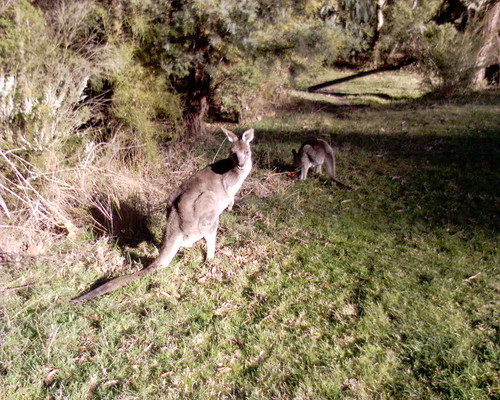Fantasy features low on the radars of students and teachers of game creation. My experience with primary school kids is that they are focussed on the mechanics of gameplay. There is little effort put into creating a consistent fantasy. Sprites (graphics) may be chosen because they look good but their effect in the game is often discordant, with conflicting metaphors in the one game. The games that primary students create have no apparent back story. Students are reluctant to provide any sort of documentation including in game help.
Malone ( Toward a Theory of Intrinsically Motivating Instruction.) postulates that intrinsic fantasy is an important element in educational games. Habgood tested this assertion with primary school students creating games. His findings are significant. Intrinsic fantasy was almost absent from games when primary school students were asked to create educational games “this study has also raised doubts about the “integral and continuing relationship” of fantasy as a critical means of improving the educational effectiveness of digital games”.
Inspection of the student made games at Haileybury shows that the students were much more interested in creating engaging game play than creating any coherent fantasy.
The game with the most developed narrative on the web site is Dragon Quest . This game was created by a team of two year 6's for the ScreenIt competition. Despite games' potential for branched narrative, this follows a linear path. It is a quest game, typical of the genre, for example Legend of Zelda (Nintendo 64). It also uses the "child saves parent" storyline.
This game is atypical of student endeavours because it was created for a competition, the students were aware that they would need to create a game of greater depth to differentiate from the competition of "teddy bears shooting ghosts and collecting diamonds" which is typical of primary school students efforts with Gamemaker. Primary school students will typically create games of the Pacman genre and when asked to improve their games usually just create extra levels or crowd the screen with extra enemies.
With the lack of any obvious narrative in these games, we may overlook the narrative formed in the creators minds. Will Wright (creator of the Sim series of games) talks of the game within the players mind. When playing a game, the player builds a mental representation in their mind of the game and this is the space in which the game is really played.
Note the game titles at Haileybury :
- Ghosts nightmare
- The toybox
- Big top haunting
- Maggot Man Return to Moggotopia
There is obviously more happening in the internal game that exists in the creator's mind than the external game reveals.
Other Worlds
Why should we care about fantasy in the game creation endeavours of primary school students? To understand this, it helps to ask about its role in mainstream media like literature. The genre that comes to mind is the fairy story and its reincarnations as sword and sorcerer and science fiction. I asked a friend about the role of Grimm's fairytales in developing his thinking. His reply was that fantasy was important to help "think outside of the square". Will Wright talks about "possibility spaces" in games. The best games are those with the largest possibility spaces.
Other worlds, such as in the literature fantasy genre are the possibility space with the greatest diversity. We can leave behind our preconceptions of the world as it is and explore the mechanics of a world as it might be. When we become creators of these fantasy worlds, we enter an infinite possibility space. We can create a new reality with a rule set which is not bound by our world. Will the creators of these worlds become creative thinkers who can think outside the box? Are there "competencies based on notions of iconoclasts, mavericks, unconventional eccentricity, rebellious simplicity and marching to a different drummer"? Arti
Visual literacy
Literacy is a word prone to misuse as we probe new literacies.
Verbal literacy is not the only "semiotic domain" where thinking takes place. Words, written and spoken, are symbols which create meaning. Visual images, music etc. can also be symbols which are loaded with meaning. With the internet and multimedia, our society is developing more sophistication with it use of symbols other than words. For example, advertising may convey meaning without using words. The creators and consumers need visual literacy.
For me, literacy is an appropriate word to describe competence where meaning is encoded in a system of symbols. These symbols can be words, smileys and other SMS speak, visual images, performance art, music and games. This is not a new idea. Poetry is a domain where words are overloaded with meaning including visual images, sounds and smells. (Poetry is the C++ of literature or maybe C++ is the poetry of programming. )
We need to be fluent encoders and and decoders of these symbols to be able to function well in society.
Using Game Creation to Develop other Literacies
What is happening in the game within the mind of the game programmer? How complex is the virtual world they have created? It surely is more complex than its external representation, teddy bears shooting ghosts, but how much more complex? Interviews with students might give more insights.
Discussion of complex virtual worlds might help students imagine larger "possibility spaces". Screening video grabs of complex worlds may also prime creative thinking.
Labels: computerclub, fantasy, gamemaker, literacy


